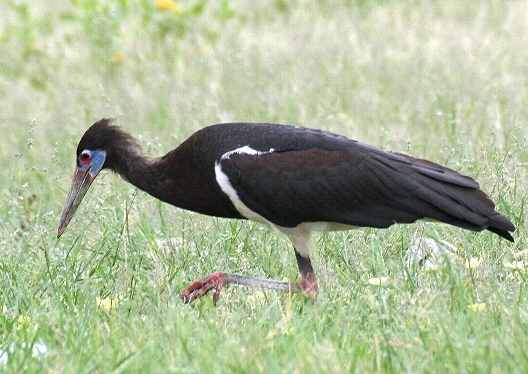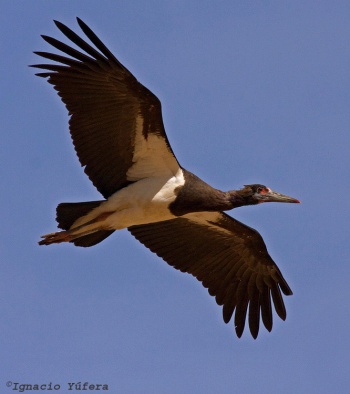m (→External Links: Added {{GS-checked}} <br /> <br />) |
|||
| (17 intermediate revisions by 9 users not shown) | |||
| Line 1: | Line 1: | ||
| − | + | [[Image:Abdims_Stork.jpg|thumb|550px|right|Photo by {{user|Max+Holdt|Max Holdt}}<br />Etosha, [[Namibia]]]] | |
| − | [[Image:Abdims_Stork.jpg|thumb|550px|right|Photo by Max Holdt]] | + | '''Alternative name: White-bellied Stork''' |
| + | ;[[:Category:Ciconia|Ciconia]] abdimii | ||
==Identification== | ==Identification== | ||
| − | + | 73 cm<br /> | |
| + | *Black body | ||
| + | *White underparts | ||
| + | *Grey legs with red knees and feet; | ||
| + | *Grey bill | ||
| + | *Red facial skin in front of the eye | ||
| + | *Blue skin near the bill in breeding season<br /> | ||
| + | The female is slightly smaller than male. | ||
| − | + | '''Similar Species.''' Black Stork is similarly plumaged, but has red bill and legs and lacks the white lower back and rump of Abdim's. Moreover, the longer legs, bill and neck of Black Stork give it a quite different flight silhouette. | |
| − | + | ==Distribution== | |
| + | Open habitats through much of Sub-Saharan [[Africa]] - from [[Ethiopia]] south to [[South Africa]] and stretching | ||
| + | as far west as [[Gambia]] and [[Senegal]] - and also in south-western [[Arabia]]. | ||
| + | [[Image:Abdim s copia.jpg|thumb|350px|right|Photo by {{user|Ignacio|Ignacio}}<br />Near Waterberg, [[Namibia]], January 2008]] | ||
| + | ==Taxonomy== | ||
| + | This is a [[Dictionary_M-O#M|monotypic]] species<sup>[[#References|1]]</sup>. | ||
| + | |||
| + | ==Habitat== | ||
| + | Open fields | ||
| + | ==Behaviour== | ||
| + | Highly gregarious. Large flocks numbering hundreds may be seen in feeding parties spread through grasslands or soaring on thermals. | ||
| + | ====Breeding==== | ||
| + | Colonial breeder, nesting in trees, with each pair laying 2-3 eggs. | ||
| + | ====Diet==== | ||
| + | The diet consists mainly of locusts, caterpillars and other large insects. | ||
| + | |||
| + | ==In Culture== | ||
The smallest stork, the name commemorates the Turkish Governor of Wadi Halfa in Sudan Bey El-Arnaut Abdim (1780-1827). | The smallest stork, the name commemorates the Turkish Governor of Wadi Halfa in Sudan Bey El-Arnaut Abdim (1780-1827). | ||
| − | + | ==References== | |
| − | + | #{{Ref-Clements6thDec08}} | |
| + | #Wikipedia | ||
| + | {{ref}} | ||
==External Links== | ==External Links== | ||
| − | + | {{GSearch|Ciconia+abdimii}} | |
| − | [[Category:Birds]] | + | [[Category:Birds]] [[Category:Ciconia]] |
| + | {{GS-checked}} | ||
| + | <br /> | ||
| + | <br /> | ||
Latest revision as of 10:44, 17 November 2021
Alternative name: White-bellied Stork
- Ciconia abdimii
Identification
73 cm
- Black body
- White underparts
- Grey legs with red knees and feet;
- Grey bill
- Red facial skin in front of the eye
- Blue skin near the bill in breeding season
The female is slightly smaller than male.
Similar Species. Black Stork is similarly plumaged, but has red bill and legs and lacks the white lower back and rump of Abdim's. Moreover, the longer legs, bill and neck of Black Stork give it a quite different flight silhouette.
Distribution
Open habitats through much of Sub-Saharan Africa - from Ethiopia south to South Africa and stretching as far west as Gambia and Senegal - and also in south-western Arabia.
Taxonomy
Habitat
Open fields
Behaviour
Highly gregarious. Large flocks numbering hundreds may be seen in feeding parties spread through grasslands or soaring on thermals.
Breeding
Colonial breeder, nesting in trees, with each pair laying 2-3 eggs.
Diet
The diet consists mainly of locusts, caterpillars and other large insects.
In Culture
The smallest stork, the name commemorates the Turkish Governor of Wadi Halfa in Sudan Bey El-Arnaut Abdim (1780-1827).
References
- Clements, JF. 2008. The Clements Checklist of Birds of the World. 6th ed., with updates to December 2008. Ithaca: Cornell Univ. Press. ISBN 978-0801445019.
- Wikipedia
Recommended Citation
- BirdForum Opus contributors. (2024) Abdim's Stork. In: BirdForum, the forum for wild birds and birding. Retrieved 8 May 2024 from https://www.birdforum.net/opus/Abdim%27s_Stork
External Links
GSearch checked for 2020 platform.





